高中英语北师大版选修模块8 Unit 23 Conflict Lesson 1 Gramma课件(共26张PPT)
文档属性
| 名称 | 高中英语北师大版选修模块8 Unit 23 Conflict Lesson 1 Gramma课件(共26张PPT) |

|
|
| 格式 | zip | ||
| 文件大小 | 311.2KB | ||
| 资源类型 | 教案 | ||
| 版本资源 | 北师大版 | ||
| 科目 | 英语 | ||
| 更新时间 | 2018-11-26 00:00:00 | ||
图片预览


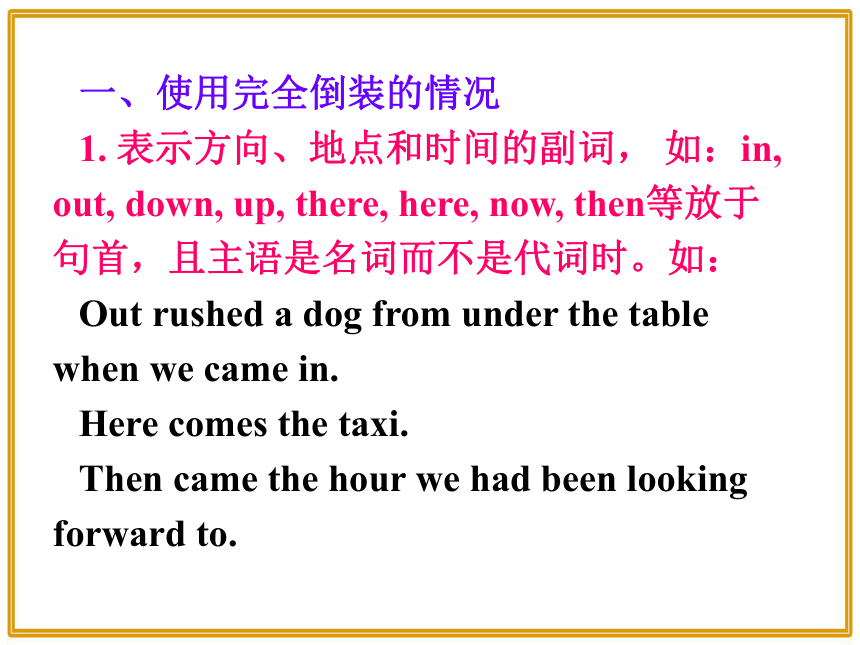
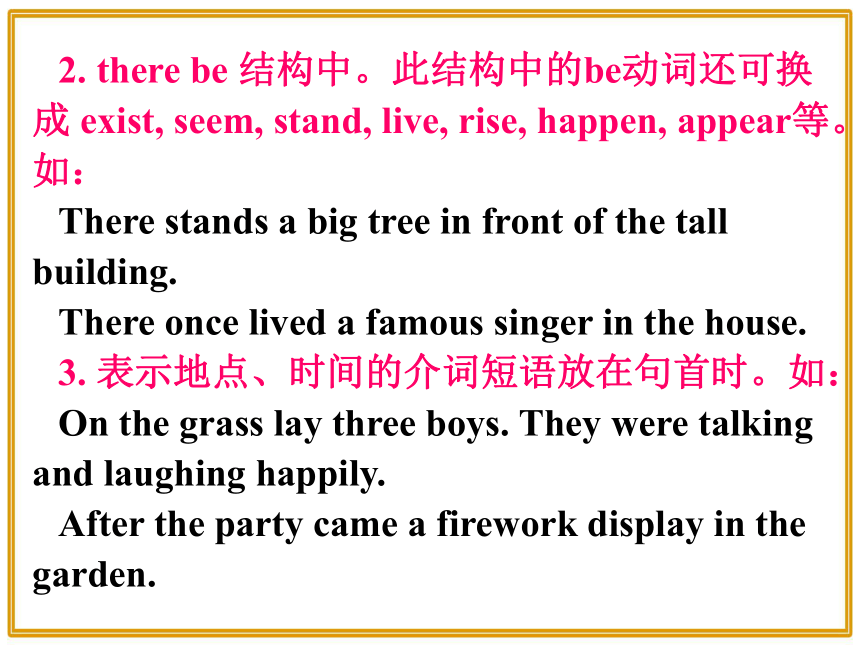
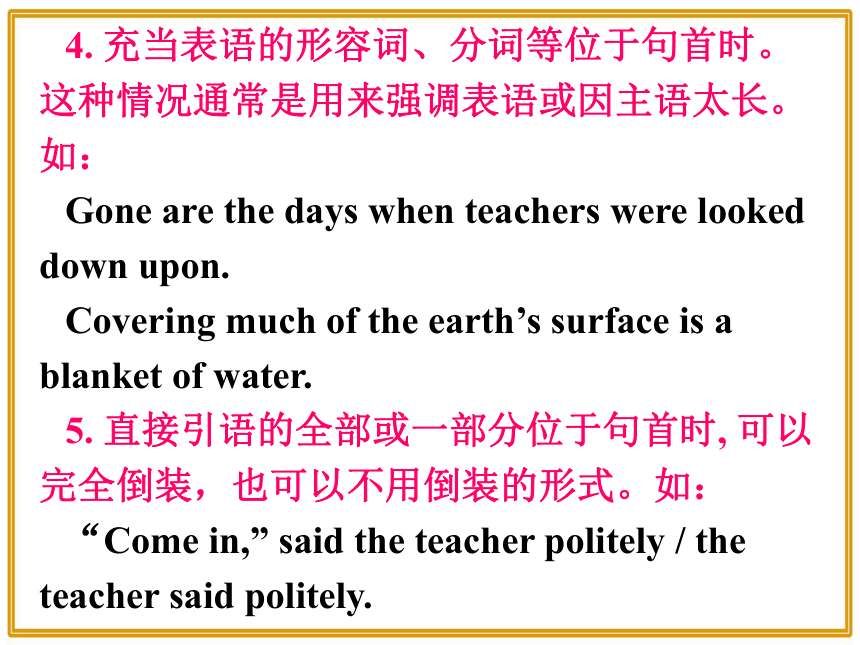
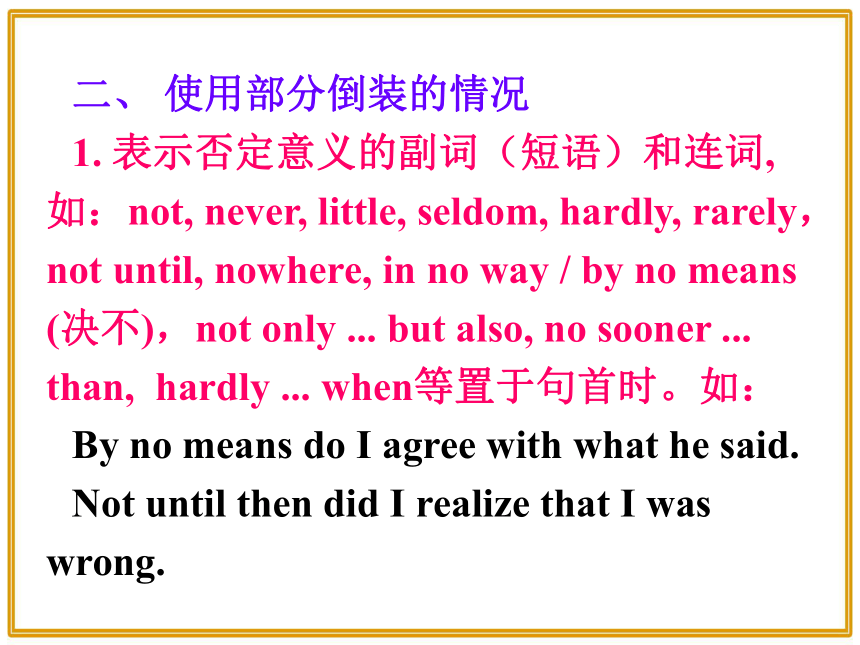
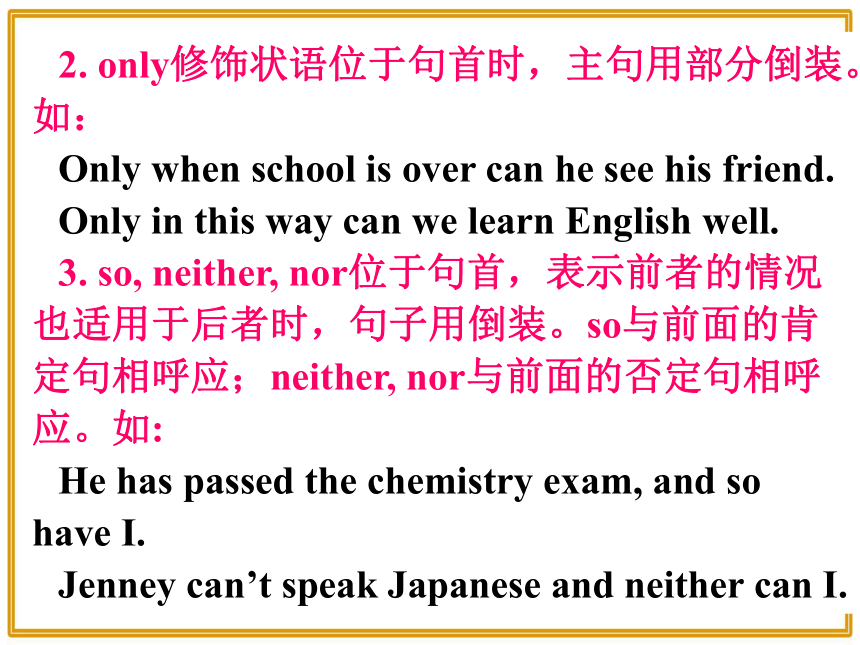
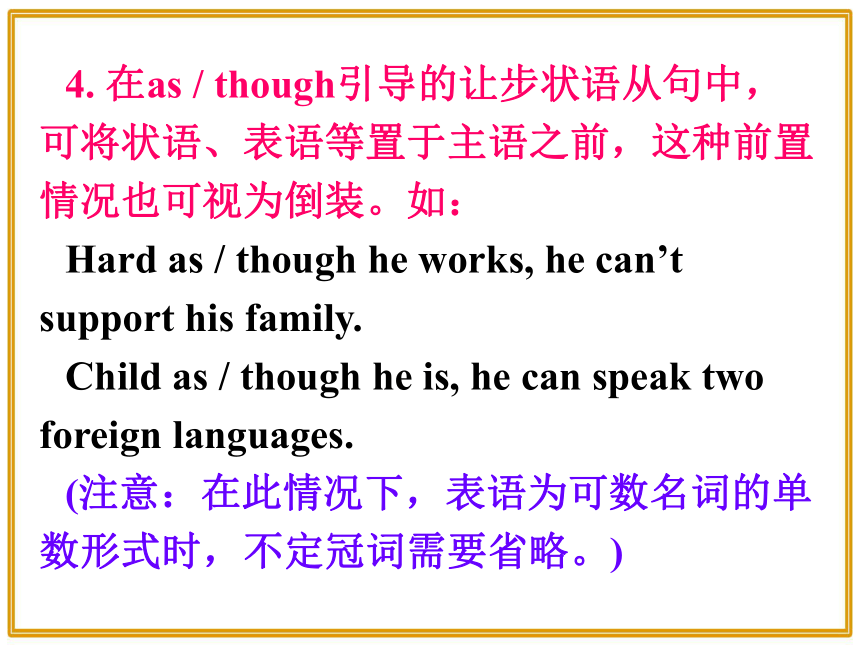
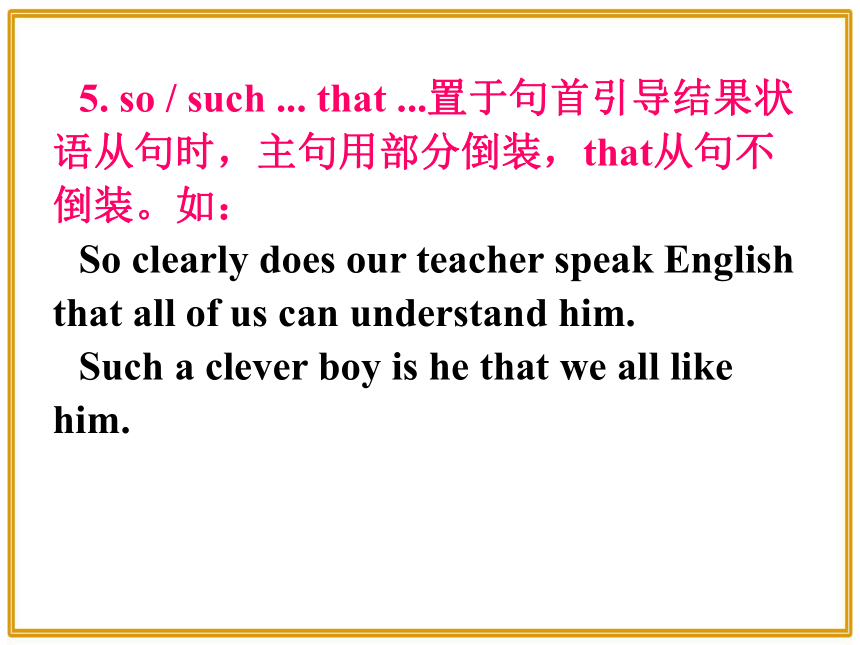
文档简介
课件26张PPT。Unit 23 Conflict
Lesson 1 Gramma 英语句子的正常语序通常是主语在前,谓语在后。但有时出于语法需要或为了达到某种修辞目的,要把谓语放在主语前面,这种语序称作倒装语序。将整个谓语移至主语之前,称为“完全倒装”;如果只是把助动词或情态动词等部分谓语放在主语之前,称为“部分倒装”。 倒装句一、使用完全倒装的情况
1. 表示方向、地点和时间的副词, 如:in, out, down, up, there, here, now, then等放于句首,且主语是名词而不是代词时。如:
Out rushed a dog from under the table when we came in.
Here comes the taxi.
Then came the hour we had been looking forward to.2. there be 结构中。此结构中的be动词还可换成 exist, seem, stand, live, rise, happen, appear等。如:
There stands a big tree in front of the tall building.
There once lived a famous singer in the house.
3. 表示地点、时间的介词短语放在句首时。如:
On the grass lay three boys. They were talking and laughing happily.
After the party came a firework display in the garden. 4. 充当表语的形容词、分词等位于句首时。这种情况通常是用来强调表语或因主语太长。如:
Gone are the days when teachers were looked down upon.
Covering much of the earth’s surface is a blanket of water.
5. 直接引语的全部或一部分位于句首时, 可以完全倒装,也可以不用倒装的形式。如:
“Come in,” said the teacher politely / the teacher said politely.二、 使用部分倒装的情况
1. 表示否定意义的副词(短语)和连词, 如:not, never, little, seldom, hardly, rarely,not until, nowhere, in no way / by no means (决不),not only ... but also, no sooner ... than,? hardly ... when等置于句首时。如:
By no means do I agree with what he said.
Not until then did I realize that I was wrong.2. only修饰状语位于句首时,主句用部分倒装。如:
Only when school is over can he see his friend.
Only in this way can we learn English well.
3. so, neither, nor位于句首,表示前者的情况也适用于后者时,句子用倒装。so与前面的肯定句相呼应;neither, nor与前面的否定句相呼应。如:
He has passed the chemistry exam, and so have I.
Jenney can’t speak Japanese and neither can I.4. 在as / though引导的让步状语从句中,可将状语、表语等置于主语之前,这种前置情况也可视为倒装。如:
Hard as / though he works, he can’t support his family.
Child as / though he is, he can speak two foreign languages.
(注意:在此情况下,表语为可数名词的单数形式时,不定冠词需要省略。)5. so / such ... that ...置于句首引导结果状语从句时,主句用部分倒装,that从句不倒装。如:
So clearly does our teacher speak English that all of us can understand him.
Such a clever boy is he that we all like him.6. 在含有were, should, had的虚拟条件句中,可以省去if, 将were, should, had提到主语之前,构成部分倒装。如:
Should it rain tomorrow, we would stay at home all day.
Had he worked harder, he would have passed the exam.1. Seldom has drumming caused such conflict.
2. No sooner had they moved in than the noise …Make a list of negative words and expressions that these sentences begin with.3. Neither could they relax or read a book …
4. Neither could we get rid of the smell …
5. Rarely had Laurene seen Mckay move …He has not only decided to move apartments, he is actually leaving Shanghai after his neighbours made several complaints about the loss of sleep.
Not only has he decided to move apartments, …
2. He has never known anything like it.
Never has he known anything like it.
3. Drumming has seldom caused such conflict.
Seldom has drumming caused such conflict.
4. If they had known their neighbour was a drummer, they wouldn’t have moved into the building.
Had they known their ….5. They had no sooner moved in than the noise began and they rarely got a full night’s sleep.
No sooner had they moved in than the noise began and rarely did they get a full night’s sleep.
6. They could not relax or read a book without wearing earplugs, either.
Neither could they relax or read a book without wearing earplugs. How are these neutral statements (1-3) reported in the texts?1 He is a keen gardener and a fish collector.
Not only is he a keen gardener, he is also a fish collector.
2 We’d only just moved in when the noise began.
No sooner had they moved in than the noise began.3 We couldn’t get rid of the smell of fish.
Neither could we get rid of the smell of fish!Find sentences in the texts that mean almost the same as the sentences below.1. Yang Ming feels upset most about the fact that people have classified his music as “noise”.
It is the fact that people have classified his music as “noise” that upsets him most.2. We gave Yang Ming a warning after careful consideration.
It was only after careful consideration that we gave Yang Ming a warning.
3. So much the water falling onto their balcony from Smith watering his plants did not bother them.
It wasn’t so much the water falling onto their balcony from Smith watering his plants that bothered them.Rewrite the sentences to make them more emphatic and more formal.1. They will never sell their antique furniture.
2. If she had come, she would’ve met the famous statesman.
Never will they sell their antique furniture.Had she come, she would’ve met the
famous statesman. 3. He didn’t only clean the bedding, he cleaned the whole bungalow as well.
4. We can hardly ever see across the bay because of the smog.Not only did he clean the bedding, he
cleaned the whole bungalow as well. Hardly ever can we see across the bay because of the smog.5. Politicians hardly ever experience a real war.
6. I don’t argue and I’ve never been in a flight either. Hardly ever do politicians experience real war.I don’t argue and neither have I ever
been in a fight. Complete sentences using the beginnings and the cues provided.1. British football fans are the most violent in Europe.
2. The sun on the water is a wonderful sight.Seldom is it quiet after the match.Rarely does one see anything so beautiful.3. The people got out just in time.
4. The press conference created huge interest.No sooner had the last person left than the fire broke out. Never before had there been such a large number of reporters and journalists.Rewrite sentences to emphasis the underlined part.1. Jenny wrote a letter to the manager.
2. I’m allergic to milk, not wheat.It was Jenny who wrote a letter to the manager. It is milk that I’m allergic to, not wheat. 3. She always argues with her mother, not her father.
4. Jim took part in the race because of the prizes. It was with her mother that she always argues, not her father. It was because of the prizes that Tim took part in the race.HomeworkFinish off the exercises on the learning sheets.
Lesson 1 Gramma 英语句子的正常语序通常是主语在前,谓语在后。但有时出于语法需要或为了达到某种修辞目的,要把谓语放在主语前面,这种语序称作倒装语序。将整个谓语移至主语之前,称为“完全倒装”;如果只是把助动词或情态动词等部分谓语放在主语之前,称为“部分倒装”。 倒装句一、使用完全倒装的情况
1. 表示方向、地点和时间的副词, 如:in, out, down, up, there, here, now, then等放于句首,且主语是名词而不是代词时。如:
Out rushed a dog from under the table when we came in.
Here comes the taxi.
Then came the hour we had been looking forward to.2. there be 结构中。此结构中的be动词还可换成 exist, seem, stand, live, rise, happen, appear等。如:
There stands a big tree in front of the tall building.
There once lived a famous singer in the house.
3. 表示地点、时间的介词短语放在句首时。如:
On the grass lay three boys. They were talking and laughing happily.
After the party came a firework display in the garden. 4. 充当表语的形容词、分词等位于句首时。这种情况通常是用来强调表语或因主语太长。如:
Gone are the days when teachers were looked down upon.
Covering much of the earth’s surface is a blanket of water.
5. 直接引语的全部或一部分位于句首时, 可以完全倒装,也可以不用倒装的形式。如:
“Come in,” said the teacher politely / the teacher said politely.二、 使用部分倒装的情况
1. 表示否定意义的副词(短语)和连词, 如:not, never, little, seldom, hardly, rarely,not until, nowhere, in no way / by no means (决不),not only ... but also, no sooner ... than,? hardly ... when等置于句首时。如:
By no means do I agree with what he said.
Not until then did I realize that I was wrong.2. only修饰状语位于句首时,主句用部分倒装。如:
Only when school is over can he see his friend.
Only in this way can we learn English well.
3. so, neither, nor位于句首,表示前者的情况也适用于后者时,句子用倒装。so与前面的肯定句相呼应;neither, nor与前面的否定句相呼应。如:
He has passed the chemistry exam, and so have I.
Jenney can’t speak Japanese and neither can I.4. 在as / though引导的让步状语从句中,可将状语、表语等置于主语之前,这种前置情况也可视为倒装。如:
Hard as / though he works, he can’t support his family.
Child as / though he is, he can speak two foreign languages.
(注意:在此情况下,表语为可数名词的单数形式时,不定冠词需要省略。)5. so / such ... that ...置于句首引导结果状语从句时,主句用部分倒装,that从句不倒装。如:
So clearly does our teacher speak English that all of us can understand him.
Such a clever boy is he that we all like him.6. 在含有were, should, had的虚拟条件句中,可以省去if, 将were, should, had提到主语之前,构成部分倒装。如:
Should it rain tomorrow, we would stay at home all day.
Had he worked harder, he would have passed the exam.1. Seldom has drumming caused such conflict.
2. No sooner had they moved in than the noise …Make a list of negative words and expressions that these sentences begin with.3. Neither could they relax or read a book …
4. Neither could we get rid of the smell …
5. Rarely had Laurene seen Mckay move …He has not only decided to move apartments, he is actually leaving Shanghai after his neighbours made several complaints about the loss of sleep.
Not only has he decided to move apartments, …
2. He has never known anything like it.
Never has he known anything like it.
3. Drumming has seldom caused such conflict.
Seldom has drumming caused such conflict.
4. If they had known their neighbour was a drummer, they wouldn’t have moved into the building.
Had they known their ….5. They had no sooner moved in than the noise began and they rarely got a full night’s sleep.
No sooner had they moved in than the noise began and rarely did they get a full night’s sleep.
6. They could not relax or read a book without wearing earplugs, either.
Neither could they relax or read a book without wearing earplugs. How are these neutral statements (1-3) reported in the texts?1 He is a keen gardener and a fish collector.
Not only is he a keen gardener, he is also a fish collector.
2 We’d only just moved in when the noise began.
No sooner had they moved in than the noise began.3 We couldn’t get rid of the smell of fish.
Neither could we get rid of the smell of fish!Find sentences in the texts that mean almost the same as the sentences below.1. Yang Ming feels upset most about the fact that people have classified his music as “noise”.
It is the fact that people have classified his music as “noise” that upsets him most.2. We gave Yang Ming a warning after careful consideration.
It was only after careful consideration that we gave Yang Ming a warning.
3. So much the water falling onto their balcony from Smith watering his plants did not bother them.
It wasn’t so much the water falling onto their balcony from Smith watering his plants that bothered them.Rewrite the sentences to make them more emphatic and more formal.1. They will never sell their antique furniture.
2. If she had come, she would’ve met the famous statesman.
Never will they sell their antique furniture.Had she come, she would’ve met the
famous statesman. 3. He didn’t only clean the bedding, he cleaned the whole bungalow as well.
4. We can hardly ever see across the bay because of the smog.Not only did he clean the bedding, he
cleaned the whole bungalow as well. Hardly ever can we see across the bay because of the smog.5. Politicians hardly ever experience a real war.
6. I don’t argue and I’ve never been in a flight either. Hardly ever do politicians experience real war.I don’t argue and neither have I ever
been in a fight. Complete sentences using the beginnings and the cues provided.1. British football fans are the most violent in Europe.
2. The sun on the water is a wonderful sight.Seldom is it quiet after the match.Rarely does one see anything so beautiful.3. The people got out just in time.
4. The press conference created huge interest.No sooner had the last person left than the fire broke out. Never before had there been such a large number of reporters and journalists.Rewrite sentences to emphasis the underlined part.1. Jenny wrote a letter to the manager.
2. I’m allergic to milk, not wheat.It was Jenny who wrote a letter to the manager. It is milk that I’m allergic to, not wheat. 3. She always argues with her mother, not her father.
4. Jim took part in the race because of the prizes. It was with her mother that she always argues, not her father. It was because of the prizes that Tim took part in the race.HomeworkFinish off the exercises on the learning sheets.
